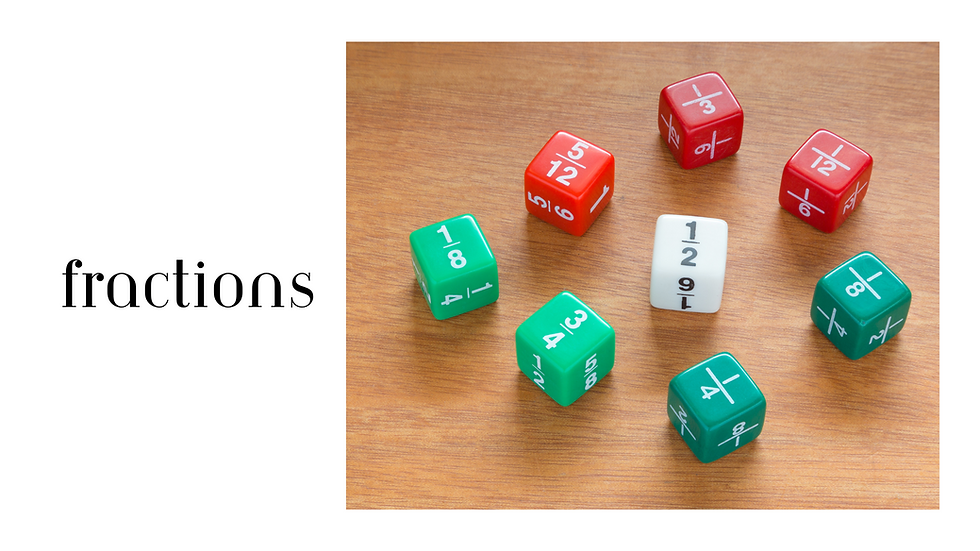Year 8 Term 1 Week 5 - Fractions in Context and Conversions
- Sallyann Clark

- Aug 31
- 4 min read

Week 5: Fractions in Context and Conversions
Introduction
This week, you’ll take all the fraction skills you’ve learned so far, addition, subtraction, multiplication, and division, and apply them to real-world problems. Fractions are not just abstract maths; they’re used in cooking, sport, construction, and science every day. By the end of this week, you’ll be confident in spotting when and how fractions are useful outside the classroom.
What should I already know?
How to simplify fractions.
How to add, subtract, multiply, and divide fractions.
How to convert between improper fractions and mixed numbers.
We covered all of this in weeks 1-4.
Real-World Application – Why This Maths Matters
Fractions in context are everywhere: cooking, medicine doses, probability in games, and sharing resources. Algebraic fractions are essential in higher-level maths and science, helping us represent unknown values and simplify expressions. Mastering these skills makes you ready for GCSE problem-solving.
Day 1 – Fractions in Word Problems
What am I Learning Today?
I will be learning to apply fraction operations to solve everyday word problems and how to convert between fractions, decimals and percentages.
Revision reminder
You should already know how to add and subtract fractions with different denominators.
Learn
Work through BBC Bitesize KS3 Maths: How to convert between fractions and decimals. There are lots of games to play, choose just one or two for today.
Task
Conclusion
You can now apply fractions to solve real-world word problems.
Day 2 – Fractions in Scaling
What am I Learning Today?
I will learn to use fractions to share quantities fairly and scale recipes or resources, as well as how to convert between fractions, decimals, and percentages.
Revision reminder
You should already know how to multiply and divide fractions.
Learn
BBC Bitesize KS3 Maths: How to convert fractions to percentages.
Just pick one or two games to play.
Task
Conclusion
You can now use fractions to scale up or down and share amounts fairly.
Day 3 – Fractions in Measurments
What am I Learning Today?
I will be learning to simplify algebraic expressions that include fractions, as well as how to convert between fractions, decimals, and percentages.
Revision reminder
You should already know how to simplify number fractions and combine like terms.
Game
Wordwall - Percentages, Decimals and Fractions
Learn
MEP 8 9.3: Conversion of Fractions and Percentages
Task
A train journey is 2 hours. You travel 3/5 of the time before a stop. How long did you travel?
A rope is 15 m long. A climber uses 2/3 of it. How many metres are used?
A tank holds 120 litres of water. 5/8 is filled. How many litres are in the tank?
Conclusion
You can now use fractions in real measurement problems.
Day 4 – Fractions in Sharing
What am I Learning Today?
I will be learning to use fractions to share amounts fairly.
Revision reminder
You should already know how to divide fractions (Week 4).
Game
Go to BBC Divided Island and select 'Quick Mode' and 'Fractions'. Do not play longer than twenty minutes.
Learn
We will round up learning about fractions by watching Beyond Revision: Introduction to Fractions. This video recaps the basics you should be confident with at this stage. We have covered more than this in our fractions unit, but these are the concepts I really want you to be secure in before moving on. The colouring sheet you can use is below, and unless you can see the writing clearly, I do not want you to complete the final task, fraction joke code breaker exercise.
Task
5 friends share 7/10 of a cake equally. How much does each person get?
A team earns £600. 3/8 goes to one group. How much is that?
A class is given 5/6 of a box of pencils. If there are 30 pencils in the full box, how many pencils do they receive?
Maths Journal Prompt: Why is dividing by a fraction the same as multiplying by its reciprocal? Write an example.
Conclusion
You can now share quantities fairly using fractions.
Day 5 – Project: The Great Fraction Bake-Off
What am I Learning Today?
Apply addition, subtraction, multiplication, and division of fractions in real-world contexts like recipes, sharing, and measurement.
Introduction
You are competing in the Great Fraction Bake-Off! To impress the judges, you need to scale recipes, share ingredients fairly, and adjust amounts precisely.
Task – The Bake-Off Challenge
Scaling the Recipe
A cake recipe for 8 people uses 3/4 cup of sugar.
How much sugar is needed for 12 people?
How much sugar is needed for 20 people?
Mixing the Ingredients
You add 2/3 of a cup of flour to the bowl. Later, you add another 5/6 of a cup.
How much flour is in the bowl altogether?
Sharing the Cake
After baking, you cut the cake into 12 equal slices.
You eat 1/4 of the cake. How many slices is that?
If 3 friends share 5/12 of the cake equally, how many slices does each friend get?
Measurement Problem
The cake takes 1 hour to bake. The oven is used for 3/5 of that time at a high temperature.
How many minutes is the cake at high temperature?
Showstopper Challenge
You are making a giant layered cake! Each layer is 1 1/2 cakes tall. If you build 2 2/3 layers, how many cakes tall is your showstopper?
Conclusion
Today, you’ve acted as a Bake-Off contestant, applying fractions to recipes, sharing, and measurements. You’ve shown that fractions are practical and essential in the kitchen and beyond.

